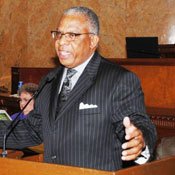Rep. George Flaggs, D-Vicksburg, has changed his tune somewhat regarding Gov. Haley Barbour's budget recommendation for merging Mississippi's historically black colleges and universities.
Barbour proposed a merger of Mississippi Valley State University and Alcorn State University with Jackson State University late last year as a cost-cutting measure to counter huge revenue shortfalls. The state faces nearly $400 million in revenue shortfalls at the beginning of the next fiscal year. The governor released a budget plan that would ultimately cut more than $411 million out of the state's $5 billion budget for the next fiscal year, when combined with cuts he already made late last year. He continues searching for other means to trim state government.
Flaggs briefly attracted the enmity of HBCU advocates when he admitted during an October speech to the Mississippi Economic Council that the state's budget crisis demanded a closer look at increasing efficiency in the state's universities, possibly to the point of some consolidation.
"I share my black colleagues' concerns (regarding HBCU mergers), but that does not erase the fact that we have an obligation to make certain that we provide quality education to every student at every university at the least cost to the taxpayer," Flaggs told the Jackson Free Press in October.
Flaggs then compared the Mississippi Legislature to the Tennessee Legislature, which mulled the possibility of merging Tennessee universities under one state board last year.
The Vicksburg representative seems to have backed away from that opinion over the last few months, however. Monday, Flaggs appeared cool to the prospect of merging any university.
"I've looked at the governor's numbers, and they don't work," Flaggs said. "We need to do everything we can to help enrollment by getting the message out that we need all eight universities. In any case, I don't think the House or Senate is going to do it, and I think what's on the table now is how to strengthen all universities, as opposed to pitting them against one another."
Jackson resident Matt Thomas said he found Flaggs' opinion unsurprising. He said any black legislator who considers the possibility of going along with the governor's merger proposal will face angry black voters in 2011.
"I believe the Legislative Black Caucus is largely supportive of HBCUs," said Thomas, who criticized Flaggs' earlier opinion on mergers. "They know they need funding, not consolidation, and that we need more cheerleaders than referees. If we find people in the Black Caucus who don't support HBCUs, we plan to make sure they won't be there in 2012."
Punctuating that sentiment, alumni, students, and advocates for historically black colleges and universities marched to the state Capitol from the Mississippi State Fairgrounds Monday to recognize the birthday of Rev. Martin Luther King Jr., and to protest Barbour's merger proposal.
At the rally, HBCU advocates demanded that Barbour remove the HBCU merger from the table. "We are here to serve notice to Haley Barbour," said rally organizer Othor Cain, who helped the Mississippi NAACP coordinate the march.
"How dare you," Cain said, challenging Barbour. "How dare you fix your mouth to talk about a merger of our historically black colleges and universities? This is a smokescreen, and we want you to now that today during the legislative session we are watching you."
Cain pointed out that Barbour and legislators recently approved $35 million in incentives to coax a German pipe manufacturer to build a factory in the state, and accused the governor of leaving the job half done.
"My question to the legislators and the governor is where would you get your work force from for this new plant? Will you go outside of the state, or depend on the citizens of the state to provide an educated work force? If you want that work force to come from Mississippi, then why on God's earth would you make any education hard to access?" Cain said.
Jackson State University senior Richetta Wilson warned that merging the schools would put an end to many family legacies.
"We've got students whose family goes back generations at these schools. Your parents went there, and you're encouraged to go there too," Wilson said. "This goes back for many years. How can you destroy something like that?
Cain's message also carried a warning to some black legislators who may support the governor's call for a merger.
"To our state elected officials: You are not off the hook, because the ball is in your court. Just because you have the same skin hue as I do, does not let you escape from what you have to do to protect struggling black colleges and universities in this great state," Cain said. "We're watching the Universities and Colleges Committee, we're watching the Education Committee, and the Appropriations Committee, and the Ways and means Committee. We're watching you all."



Comments
Use the comment form below to begin a discussion about this content.
comments powered by Disqus